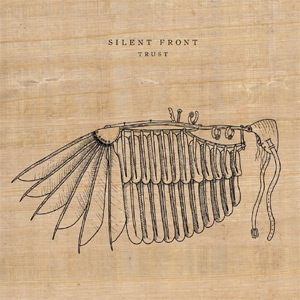On the album Blood Oaths For The New Blues, James Jackson Toth of Wooden Wand sang a line that’s stuck with me ever since: "If there’s one thing that cannot be taught, it’s belief." It’s something I’ve turned around in my head a lot as I’ve moved further away from the kind of punk and post-hardcore music that defined a large part of my teenage years and away from the experiences, or the myths, I bought into back then. Seeing Neil Young & Crazy Horse in a rain-soaked stadium last year, with the PA swinging dangerously in the wind and thousands of people there only to hear songs Young had no intention of playing, crystallised the feeling of Toth’s lyric. After that gig I had a stronger idea of where I stood in relation to the rough old beast of rock music, the kind of spaces where I could, for a brief and blissful time, once again believe.
With that in mind, I can say I believe Silent Front. I believe in the sounds I’ve heard them make, in the places I’ve heard them make them. The basements and back-rooms of small bars that no one goes to unless there’s a gig on or small DIY spaces carved out by dedicated groups of outcasts – these are the homes, natural or not, of this kind of music. The problem with listening to (and more so reviewing) an album by this band is that I can’t unlink the sounds from the physical spaces in which I’ve heard them, from my memories of experiencing them. The first time was in a basement with a low ceiling. I was very drunk and it was raining hard. They were so loud! It was Hallowe’en, 2010. They’d already been a band, in one form or another, for over ten years. I bought their first album, Dead Lake, immediately after and listened to it regularly on one of those awful all-in-one radio/record player things I’d got for Christmas the year before. It sounded shit, but I could fill in the blanks.
Silent Front’s second album is called Trust. It sounds a lot better than Dead Lake did and so there are fewer blanks to fill in. I’ve got a better stereo too. The production sounds like a band playing live in a room, which is what it is. No layers of guitars necessary for impact, this is raw, bare and alive. It’s still messy in places (this is no Shellac recording), but generally the drums cut through enough to always drive things forward. Really though it’s in the bass you find the centre. Russell Whitehorn’s low-slung sound switches between the languid, the paranoid and the straight-up aggressive at will. If the guitars, drums and vocals are dangerously chaotic, it’s often in the low-end you can find a safe place to stand – holding down the mood during the breaks of ‘Bracken’, bubbling underneath in ‘Invisible Mouth’.
Still, when all four elements are at their stormiest, say the beginning of ‘Friend Or Foe’, that’s when you realise how much precision is required to keep the whole show afloat. One note out of place and what is ecstatic confusion one second could be little more than a mess by the next. This kind of post-hardcore, snapping back and forth between tempos, between quiet and loud, doesn’t allow the kind of steam-valve catharsis a chorus provides. Instead, Phil Mann’s vocals just get more neurotic, angrier, more desperate, following the many twists and turns the music takes. The album’s finest virtue is the concision with which those complex structures are played out. Many similarly inclined bands have verged on (or succumbed to) prog-heavy indulgence but there is no fat on these particular bones.
The limits of this raw approach to album construction do rear their heads though. ‘Confiance’ sits at the centre of the album, a quiet instrumental that is all about the push and pull between grooves, the subtle differences between repetitions. It suffers more than most of the other tracks when recorded because it’s not physically necessary here. The role it plays during a gig is obvious, allowing a collective intake of breath without losing the atmosphere, keeping things uneasily balanced on a knife-edge. On record, it feels too long, too sparse, to really command the same attention and serve the same purpose.
Now almost 15 years into their "career", Trust is the best document of the band yet. But that is all it can be; a document, a snapshot. This is music that thrives on the uncomfortably intimate connection between a band and their sweating, heaving audience. In real time, in real space. In that confined and often painful place, there is a trust that develops – it’s what gives real punk community its revelatory feeling of inclusiveness and safety amid all the surface noise and violence. It is a trust that is physical and mental, first of the body and later of the mind, of memory. Because when I put on a record like this, no matter what kind of stereo I’m playing it through, I hear it as if it’s coming direct from the amps piled high on stage. Hearing it as if there are people beside me sweating and jumping and smiling too. My belief in these songs is built on the impact of those amps, the pound of the drums I could almost reach out and touch.


